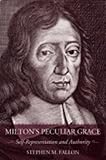Milton's Peculiar Grace : Self-Representation and Authority / Stephen M. Fallon.
Material type: TextPublisher: Ithaca, NY : Cornell University Press, [2018]Copyright date: ©2008Description: 1 online resource (296 p.)Content type:
TextPublisher: Ithaca, NY : Cornell University Press, [2018]Copyright date: ©2008Description: 1 online resource (296 p.)Content type: - 9781501732416
- 821/.4 22
- online - DeGruyter
| Item type | Current library | Call number | URL | Status | Notes | Barcode | |
|---|---|---|---|---|---|---|---|
 eBook
eBook
|
Biblioteca "Angelicum" Pont. Univ. S.Tommaso d'Aquino Nuvola online | online - DeGruyter (Browse shelf(Opens below)) | Online access | Not for loan (Accesso limitato) | Accesso per gli utenti autorizzati / Access for authorized users | (dgr)9781501732416 |
Browsing Biblioteca "Angelicum" Pont. Univ. S.Tommaso d'Aquino shelves, Shelving location: Nuvola online Close shelf browser (Hides shelf browser)

|

|

|

|

|

|

|
||
| online - DeGruyter Talk of the Nation : Language and Conflict in Romania and Slovakia / | online - DeGruyter Taking Back the Workers' Law : How to Fight the Assault on Labor Rights / | online - DeGruyter The Fragility of Empathy after the Holocaust / | online - DeGruyter Milton's Peculiar Grace : Self-Representation and Authority / | online - DeGruyter Paranoia and Modernity : Cervantes to Rousseau / | online - DeGruyter The Foe Within : Fantasies of Treason and the End of Imperial Russia / | online - DeGruyter The Structure of Old Norse "Dróttkvætt" Poetry / |
Frontmatter -- Contents -- Preface: The Anomalous Milton -- Acknowledgments -- Texts and Abbreviations -- 1. Self-Representation, Intention, and Authority -- 2. The Least of Sinners: Milton in Context -- 3. “Himself before Himself ”: The Early Works -- 4. “Kingdom of Free Spirits”: The Anti-Prelatical Works -- 5. “The Spur of Self-Concernment”: The Works on Domestic Liberty -- 6. “It Was I and No Other”: Interregnum Prose -- 7. “Elect above the Rest”: De Doctrina Christiana and Paradise Lost -- 8. “If All Be Mine”: Confi dence and Anxiety in Paradise Lost -- 9. “I as All Others”: Paradise Regained and Samson Agonistes -- Epilogue -- Index
restricted access online access with authorization star
http://purl.org/coar/access_right/c_16ec
Despite writing about himself extensively and repeatedly, John Milton, the archetypal Puritan author, resolutely avoids the obligatory Augustinian narrative of sinfulness, conviction of sin, reception of the Word, regeneration of the spirit, and sanctification. The doctrine of fall, grace, and regeneration, so well illustrated in Paradise Lost, has no discernible effect on Milton's overt self-representations. Exploring this anomaly in his new book, Stephen M. Fallon contends that Milton, despite his deep engagement with theology, is not a religious writer.Why, Fallon asks, does Milton write about himself so compulsively? Why does he substitute, for the otherwise universal theological script, a story of precocious and continued virtue, even, it seems, a narrative of sinlessness? What pressures does this decision to reject the standard narrative exert on his work?In Milton's Peculiar Grace, Fallon argues that Milton writes about himself to gain immortality, secure authority for his arguments, and exert control over his readers' interpretations. He traces the return of the repressed narrative of fallenness in the author's unacknowledged and displaced self-representations, which in turn account for much of the power of the late poems. Fallon's book, based on close readings of Milton's "self-constructions" in prose and poetry throughout his career, provides a new view of Milton's life and his importance for contemporary literary theory-in particular for continued questions about authorial intention.To listen to a radio interview with Stephen Fallon discussing Milton's enduring significance, on the Australian Broadcasting Company's "Late Night Live," click here.
Mode of access: Internet via World Wide Web.
In English.
Description based on online resource; title from PDF title page (publisher's Web site, viewed 26. Apr 2024)


